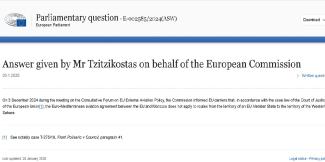
Brussels (EU Commission) 20 January 2025 (SPS)- The European Commission has confirmed that the Euro-Mediterranean aviation agreement between the EU and Morocco does not apply to Western Sahara, in a written answer Today by the Commission to a written question from MEP Lynn Boylan (The Left) regarding Ryanair's announcement of new routes to the occupied city of Dakhla, in Western Sahara.
In its response, the Commission emphasized that “on 3 December 2024 during the meeting on the Consultative Forum on EU External Aviation Policy, the Commission informed EU carriers that, in accordance with the case law of the Court of Justice of the European Union, the Euro-Mediterranean aviation agreement between the EU and Morocco does not apply to routes from the territory of an EU Member State to the territory of the Western Sahara.”
The CJEU, it should be recalled, determined that the aviation agreement between the EU and Morocco cannot extend to flights involving Western Sahara, as the territory is not part of Morocco's recognized sovereignty.
The issue arose after Ryanair described Dakhla as part of the Kingdom of Morocco in its announcement, a position that aligns with the Moroccan Government colonial claims but is inconsistent with international law and EU policy and CJEU rulings.
It should be recalled that the written question has underscored the importance of adhering to EU legal frameworks in external aviation agreements, reminding carriers of their obligations when operating routes involving occupied territories.
It also raised questions about the responsibilities of EU-based companies, such as refraining from advertising the Sahrawi occupied territories in a way that misrepresent their truthful international status.
The situation highlights ongoing victories achieved by the Sahrawi resistance against the Moroccan and foreign violations. It also illustrates the EU's commitment to upholding international law in its external agreements and the accountability of European companies operating in such complex geopolitical contexts. (SPS)
090/500/60 (SPS)